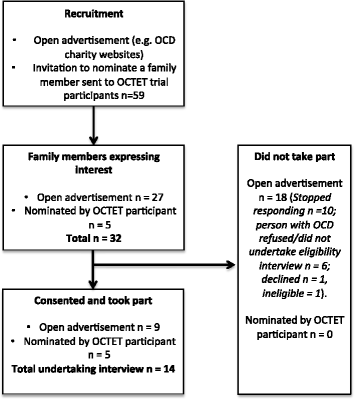Separating obsessive-compulsive disorder from the self. A qualitative study of family member perceptions
- PMID: 28882118
- PMCID: PMC5590215
- DOI: 10.1186/s12888-017-1470-4
Separating obsessive-compulsive disorder from the self. A qualitative study of family member perceptions
Abstract
Background: Obsessive-compulsive disorder (OCD) is a condition which can have major effects on the life of both the sufferer and their family members. Previous research has shown that the impact of illness on family members is related to their conceptualisation of the illness. In the present study we used qualitative methods to explore illness perceptions in family members of people with OCD.
Method: Fourteen family members of people meeting diagnostic criteria for OCD within the previous year took part in a semi-structured interview. Transcribed interviews were analysed using thematic analysis.
Results: OCD was viewed as originating from non-modifiable endogenous factors, particularly personal characteristics. Ambiguity about the boundary between OCD and the person was further heightened by a lack of distinction in family members' interpretations about which behaviours were a problematic symptom of a mental health problem and which were behaviours performed for enjoyment or the purposeful pursuit of a goal. The perceived close relationship between OCD and the person appeared to lead to pessimism regarding the likelihood of recovery. Some individuals viewed OCD as presenting on a continuum such that individuals with sub-clinical symptoms exist on the same spectrum as those with the mental health problem. For some however, labelling of sub-clinical symptoms as OCD by members of the public was a source of frustration for families, who felt that the severity of OCD was unrecognised.
Conclusions: Family members' perceptions of the link between OCD and the person and of a spectrum of OCD presentation within the general population, may represent important dimensions of illness perception, which are not currently represented within existing models or assessment measures of illness perception. The perceptions that individuals hold about a health problem have been shown to be important in determining their coping responses to that condition. Further study using larger samples and quantitative methods are needed to understand whether these novel perceptions are associated with coping responses and outcomes in family members and people with OCD. If linked, clinicians may need to identify and challenge unhelpful family member perceptions as part of psychological therapy for families living with OCD.
Keywords: Beliefs; Illness perceptions; OCD; Obsessive-compulsive disorder.
Conflict of interest statement
Ethics approval and consent to participate
Ethical approval was granted by the NRES Committee North West – Lancaster (Ref: 13/NW/0506). All participants provided written informed consent before taking part in this study.
Consent for publication
All participants provided written consent for their anonymised quotes to be published.
Competing interests
The authors declare that they have no competing interests.
Publisher’s Note
Springer Nature remains neutral with regard to jurisdictional claims in published maps and institutional affiliations.
Similar articles
-
Illness perceptions in people with obsessive-compulsive disorder; A qualitative study.PLoS One. 2019 Mar 20;14(3):e0213495. doi: 10.1371/journal.pone.0213495. eCollection 2019. PLoS One. 2019. PMID: 30893331 Free PMC article. Clinical Trial.
-
Testing the psychometric properties of the illness perceptions questionnaire for OCD (IPQ-O).BMC Psychiatry. 2019 Jul 10;19(1):217. doi: 10.1186/s12888-019-2195-3. BMC Psychiatry. 2019. PMID: 31291916 Free PMC article.
-
Quality of life, family burden and associated factors in relatives with obsessive-compulsive disorder.Gen Hosp Psychiatry. 2013 May-Jun;35(3):253-8. doi: 10.1016/j.genhosppsych.2013.01.004. Epub 2013 Mar 1. Gen Hosp Psychiatry. 2013. PMID: 23453525
-
Comparison of obsessive-compulsive disorder patients with and without comorbid putative obsessive-compulsive spectrum disorders using a structured clinical interview.Compr Psychiatry. 2001 Jul-Aug;42(4):291-300. doi: 10.1053/comp.2001.24586. Compr Psychiatry. 2001. PMID: 11458303 Review.
-
[Mindfulness-based interventions in obsessive-compulsive disorder: Mechanisms of action and presentation of a pilot study].Encephale. 2017 Dec;43(6):594-599. doi: 10.1016/j.encep.2016.10.004. Epub 2016 Nov 22. Encephale. 2017. PMID: 27887679 Review. French.
Cited by
-
Obsessive-compulsive existential type: a dialectical-phenomenological approach.Front Psychol. 2023 Sep 5;14:1211598. doi: 10.3389/fpsyg.2023.1211598. eCollection 2023. Front Psychol. 2023. PMID: 37736151 Free PMC article.
-
Coping Strategies and Burden Dimensions of Family Caregivers for People Diagnosed with Obsessive-Compulsive Disorder.Healthcare (Basel). 2022 Feb 28;10(3):451. doi: 10.3390/healthcare10030451. Healthcare (Basel). 2022. PMID: 35326929 Free PMC article.
-
Navigating recovery in childhood OCD: a qualitative analysis of barriers and facilitators.Child Adolesc Psychiatry Ment Health. 2024 Dec 18;18(1):160. doi: 10.1186/s13034-024-00851-8. Child Adolesc Psychiatry Ment Health. 2024. PMID: 39695802 Free PMC article.
-
Consequences of a Diagnostic Label: A Systematic Scoping Review and Thematic Framework.Front Public Health. 2021 Dec 22;9:725877. doi: 10.3389/fpubh.2021.725877. eCollection 2021. Front Public Health. 2021. PMID: 35004561 Free PMC article.
-
Illness perceptions in people with obsessive-compulsive disorder; A qualitative study.PLoS One. 2019 Mar 20;14(3):e0213495. doi: 10.1371/journal.pone.0213495. eCollection 2019. PLoS One. 2019. PMID: 30893331 Free PMC article. Clinical Trial.
References
-
- American Psychiatric Association. Diagnostic and statistical manual of mental disorders (DSM-5®). Fifth edition. Arlington, VA: American Psychiatric Association; 2013.
MeSH terms
LinkOut - more resources
Full Text Sources
Other Literature Sources
Medical


